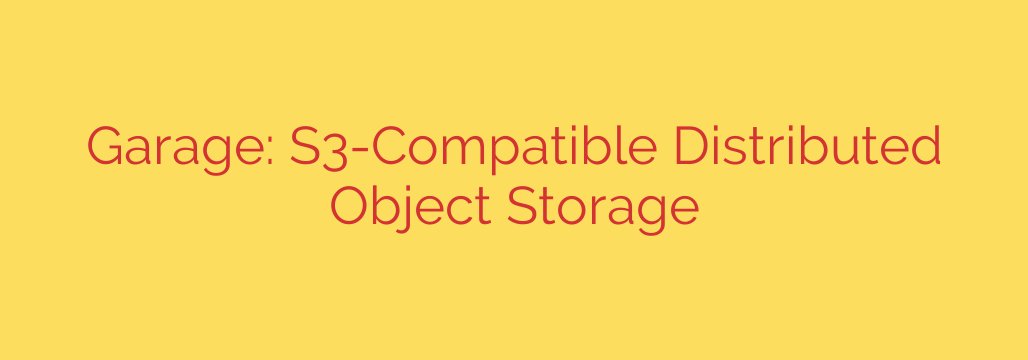
Take Control of Your Data: An Introduction to Self-Hosted, S3-Compatible Object Storage
In today’s data-driven world, object storage has become the de facto standard for managing vast amounts of unstructured data, from backups and archives to application assets and media files. While cloud giants offer powerful solutions, relying solely on them can lead to vendor lock-in, unpredictable costs, and concerns over data sovereignty. For many, the answer lies in self-hosting.
Enter Garage, a modern, self-hosted distributed object storage system designed for simplicity, reliability, and complete compatibility with the S3 API. It offers a powerful alternative for anyone seeking to build their own private storage cloud, whether for a homelab, a small business, or a geographically distributed team.
What Makes This Storage Solution Different?
Garage is engineered from the ground up to be a “boring” technology—in the best way possible. It prioritizes stability, data integrity, and ease of management over bells and whistles, making it a dependable foundation for your data infrastructure.
Built in Rust, it leverages the language’s strengths in performance and memory safety to deliver a robust and efficient system. Unlike some complex storage platforms that require a team of experts to manage, Garage is designed to be set up and maintained with minimal fuss, even across just a handful of nodes.
The Core Features That Matter
What truly sets this solution apart is its thoughtful architecture, which addresses the common pain points of distributed storage.
Truly Distributed with No Single Point of Failure: Many storage systems rely on a central metadata server or a leader node to coordinate operations. If that single component fails, the entire cluster can go down. Garage employs a decentralized, peer-to-peer architecture where all nodes are equal. This eliminates single points of failure and dramatically increases the resilience of your storage cluster.
Efficient Data Durability with Erasure Coding: Instead of simply replicating full copies of your data across multiple disks (which can be very space-intensive), Garage uses erasure coding. This advanced technique splits data into smaller fragments and adds parity fragments. The data can be fully reconstructed even if several nodes or disks fail, all while using significantly less disk space than traditional 3x replication.
Seamless S3 API Compatibility: This is a critical feature. Garage is a drop-in replacement for any application or tool that speaks S3. You can use familiar tools like
s3cmd,rclone, and countless SDKs for Python, Go, and JavaScript without changing a single line of code. Simply point your application to your Garage cluster’s endpoint, and it works.Strong Consistency Guarantees: When you write a file to your storage, you need to be certain that the next read request will see that new version. Garage provides strong read-after-write consistency. This guarantee simplifies application development and prevents confusing data inconsistencies that can plague eventually-consistent systems.
Built for Geo-Distribution: The architecture allows you to run a single storage cluster across multiple physical locations or data centers. This is ideal for disaster recovery planning and for providing low-latency data access to a distributed user base.
Who is This For?
This versatile storage solution is an excellent fit for a wide range of use cases:
- Homelab Enthusiasts and Self-Hosters: Perfect for managing personal media libraries, running private cloud services like Nextcloud, and handling backups for personal machines and servers.
- Small to Medium-Sized Businesses (SMBs): A highly cost-effective way to manage internal backups, application data, and long-term archives without incurring escalating monthly cloud storage bills.
- Organizations Requiring Data Sovereignty: For companies in regulated industries or those operating under strict data privacy laws (like GDPR), self-hosting provides complete control over the physical location and security of their data.
- Developers and DevOps Teams: Provides a reliable, S3-compatible endpoint for development and testing environments, artifact storage, and CI/CD pipelines.
Actionable Security and Management Tips
If you’re considering setting up your own distributed storage cluster, following best practices is essential for ensuring data integrity and security.
Isolate Your Storage Network: Whenever possible, run your cluster’s internal traffic on a dedicated, private network interface. This prevents storage replication and coordination traffic from interfering with public-facing services and adds a critical layer of security.
Secure Your S3 Credentials: Treat your S3 access keys and secret keys like passwords. Store them securely, use tools like Vault for management, and never commit them directly into your application’s source code.
Start with an Odd Number of Nodes: For a highly available setup, it’s recommended to start with a cluster of at least three nodes (and preferably five or more for production). An odd number of nodes helps the cluster’s consensus algorithm make clear decisions.
Monitor Your Cluster’s Health: Keep a close eye on key metrics like disk space usage, node health, network latency, and I/O performance. Proactive monitoring helps you identify and resolve potential issues before they lead to data loss or downtime.
Plan for Backups: While a distributed system with erasure coding is highly durable, it is not a backup. It protects against hardware failure, not accidental deletion, data corruption, or ransomware. Always maintain a separate, off-site backup of your most critical data.
For those ready to move beyond the limitations of traditional storage and take full control of their data infrastructure, a modern, decentralized solution like Garage offers a compelling, reliable, and refreshingly simple path forward.
Source: https://www.linuxlinks.com/garage-s3-compatible-distributed-object-storage-service/








